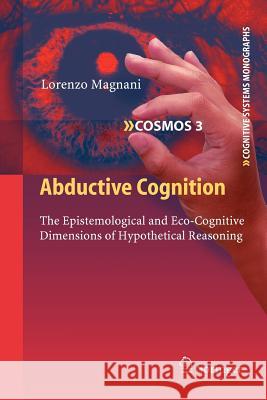Abductive Cognition: The Epistemological and Eco-Cognitive Dimensions of Hypothetical Reasoning » książka
Abductive Cognition: The Epistemological and Eco-Cognitive Dimensions of Hypothetical Reasoning
ISBN-13: 9783642260827 / Angielski / Miękka / 2012 / 535 str.
Abductive Cognition: The Epistemological and Eco-Cognitive Dimensions of Hypothetical Reasoning
ISBN-13: 9783642260827 / Angielski / Miękka / 2012 / 535 str.
(netto: 576,41 VAT: 5%)
Najniższa cena z 30 dni: 578,30
ok. 22 dni roboczych.
Darmowa dostawa!
Thisvolumeexploresabductivecognition, animportantbut, atleastuntilthe third quarter of the last century, neglected topic in cognition. It integrates and further develops ideas already introduced in a previous book, which I published in 2001 (Abduction, Reason, and Science. Processes of Discovery and Explanation, Kluwer Academic/Plenum Publishers, New York). Thestatusofabductionisverycontroversial. Whendealingwithabductive reasoning misinterpretations and equivocations are common. What are the di?erences between abduction and induction? What are the di?erences - tween abduction and the well-known hypothetico-deductive method? What did Peircemeanwhen heconsideredabductionboth a kindofinferenceanda kind of instinct or when he considered perception a kind of abduction? Does abduction involve only the generation of hypotheses or their evaluation too? Are the criteria for the best explanation in abductive reasoning epistemic, or pragmatic, or both? Does abduction preserve ignorance or extend truth or both? How many kinds of abduction are there? Is abduction merely a kind of explanatory inference or does it involve other non-explanatory ways of guessing hypotheses? The book aims at increasing knowledge about creative and expert inf- ences. The study of these high-level methods of abductive reasoning is s- uated at the crossroads of philosophy, logic, epistemology, arti?cial intel- gence, neuroscience, cognitive psychology, animal cognition and evolutionary theories; that is, at the heart of cognitive science. Philosophers of science in thetwentiethcenturyhavetraditionallydistinguishedbetweentheinferential processesactiveinthelogicofdiscoveryandtheonesactiveinthelogicofj- ti?cation. Most have concluded that no logic of creative processes exists and, moreover, that a rational model of discovery is impossible. In short, scienti?c creative inferences are irrational and there is no reasoning to hypotheses."











